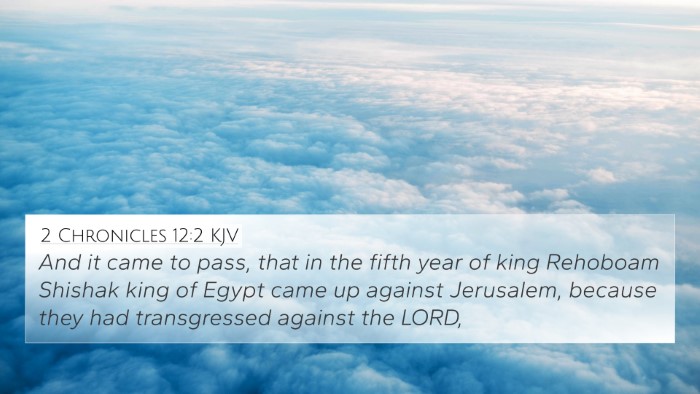Understanding 1 Kings 14:25
Verse: 1 Kings 14:25
Summary: This verse recounts a specific historical event regarding the attack on Jerusalem during the reign of King Rehoboam. It indicates a significant moment of turmoil for the Israelites, highlighting both God's judgment and the consequences of their actions.
Contextual Background
The narrative surrounding 1 Kings 14 centers on the division of the kingdom of Israel and the consequences of idolatry and rebellion against God. The account of King Rehoboam's leadership is marked by a decline in fidelity to God's commandments.
Verse Meaning and Interpretations
-
Matthew Henry's Commentary:
Matthew Henry elaborates on the implications of the attack on Jerusalem, noting that it serves as a reminder of God’s judgment over His people for their unfaithfulness. The historical context shows that political strife often mirrors spiritual decay.
-
Albert Barnes's Notes:
Barnes references that this verse underscores the importance of loyalty to the Covenant. He discusses how this event reflects the consequences of forsaking God and the resulting downfall of Jerusalem due to various kings' disobedience.
-
Adam Clarke’s Commentary:
Adam Clarke emphasizes the magnitude of the attack and its effects on the Israelites. This commentary highlights a key theme of retribution and the need for the Israelites to return to God’s ways as their protection and security.
Thematic Connections
The themes present in this verse resonate throughout the Biblical texts, showcasing the importance of faithfulness to God and the repercussions of disregarding Divine law.
-
Bible verse cross-references:
- 2 Chronicles 12:2-5 - Discusses God's warning to Rehoboam through the prophet Shemaiah during the attack on Jerusalem.
- 1 Kings 11:9-13 - Details God's anger over Solomon’s idolatry, leading to the division of the kingdom.
- Jeremiah 22:7 - A prophetic warning against those who lead Israel astray.
- Isaiah 1:4-6 - Critique of Israel’s rebellion and the consequences of their sin.
- Hosea 5:15 - Indicates God’s withdrawal from Israel and encourages them to repent to seek divine favor.
- Amos 3:2 - Highlights God’s unique covenantal relationship with Israel and their accountability.
- 2 Kings 16:5-7 - Discusses alliances made by kings representing a lack of trust in God.
- Micah 3:12 - Projected consequences of the leaders' corruption and injustice against the nation.
- Matthew 24:2 - Jesus predicts the destruction of the temple, echoing past transgressions by the kings.
- Luke 19:41-44 - Jesus weeps over Jerusalem in light of its disobedience.
Applications for Today
This verse serves as a reminder of the importance of seeking God’s guidance in leadership and personal decision-making. The lessons learned from the past narrative encourage contemporary believers to evaluate their loyalty to God amid societal pressures.
Tools for Bible Cross-Referencing
Utilizing various tools for Bible cross-referencing can deepen understanding of scripture. Some recommended tools include:
- Bible concordances that index significant terms and themes.
- Bible cross-reference guides that map connections for thematic studies.
- Comprehensive Bible cross-reference materials that detail the interconnectivity of verses.
Conclusion
The study of 1 Kings 14:25 provides profound insights into the nature of God’s relationship with His people, encouraging a faithful adherence to divine precepts. Understanding this verse within the larger Biblical narrative enhances our comprehension of similar themes and events throughout scripture.





